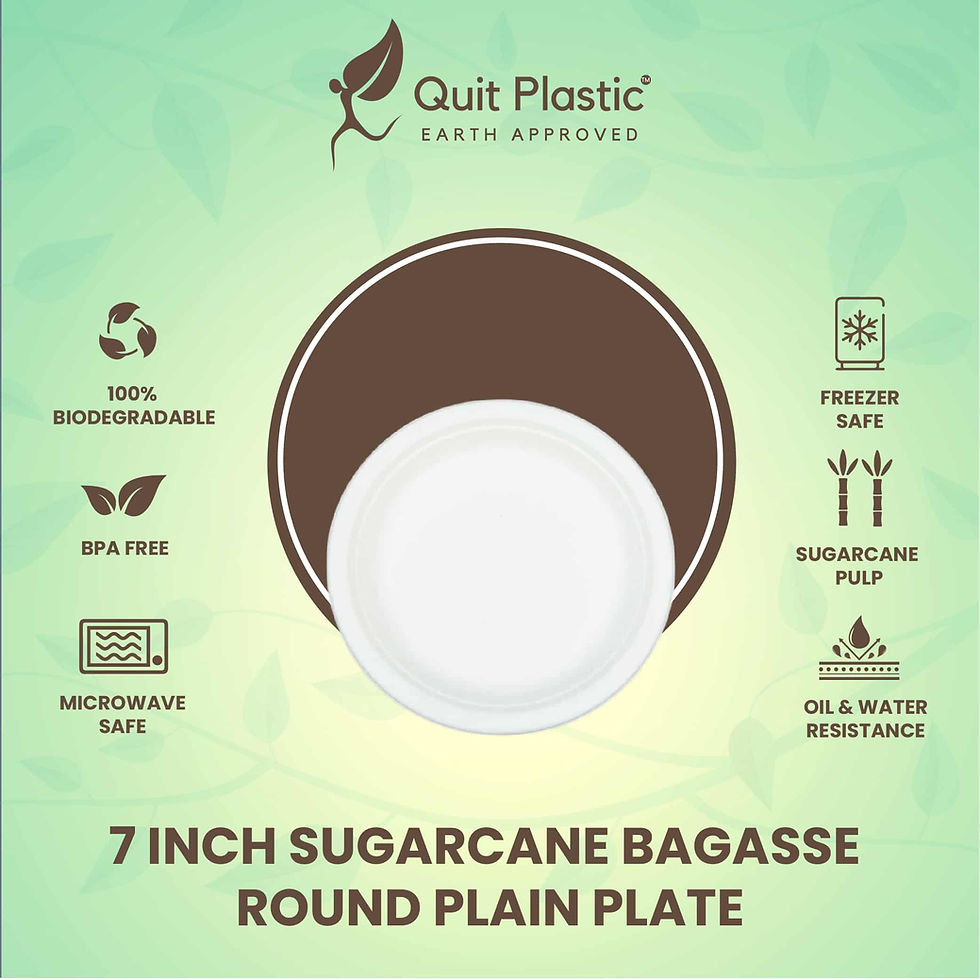Export Eco-Friendly 7-Inch Plain Round Sugarcane Bagasse Snacks Plate from Gujarat, India
- Quit Plastic
- Jul 19, 2024
- 3 min read
Updated: Dec 8, 2025

The world is waking up to the pressing issue of plastic pollution, and the food service industry is at a crossroads. Single-use plastics, such as disposable plates, significantly contribute to this environmental crisis. Fortunately, innovative solutions are emerging, and sugarcane bagasse is at the forefront of this sustainable revolution.
This blog post explores the potential of sugarcane bagasse 7-inch plates as a viable and eco-friendly alternative to traditional disposable plates. We will explore the environmental benefits, the global market, and the opportunities for businesses that export and import these sustainable products.
The Disposable Dilemma
Disposable plates have been a convenient staple in our homes and businesses for decades. However, their convenience comes at a steep environmental cost.
Paper Plates: Often coated with plastic or wax, paper plates may not be as recyclable as they appear to be. The energy-intensive production process and reliance on often-threatened forests for pulp make them a less-than-ideal choice.
Styrofoam Plates: Made from polystyrene, these plates are notorious for their environmental harm. They are non-biodegradable, contributing to landfill waste and posing a significant threat to wildlife.
The Sugarcane Solution
Sugarcane bagasse, a byproduct of sugarcane agriculture, provides a sustainable and eco-friendly alternative to traditional disposable plates.
Renewable Resource: Derived from sugarcane, a rapidly renewable crop, bagasse is a sustainable material choice.
Low Environmental Impact: The production process of sugarcane bagasse plates is relatively low-energy and produces minimal waste.
Compostable: These plates can be composted, breaking down into nutrient-rich soil and reducing landfill waste.
Food-Safe: Rigorous testing ensures the safety of sugarcane bagasse plates for use in food contact applications.
Quit Plastic: A Leader in Sustainable Packaging
Quit Plastic, a prominent Indian manufacturer and exporter, is at the forefront of the sugarcane bagasse revolution. Their 7-inch, round, white, plain plates are a prime example of their commitment to sustainability.
Product Specifications: Each 40-foot container holds 3,700 master cartons, containing 1,850,000 plates. Weighing approximately 10 tonnes, the container has an FOB value of INR 26,936,000 (USD 32,190).
Export and Import: Quit Plastic facilitates exports from Hazira Port, Surat, Gujarat, India. Importers can easily place orders and arrange shipping, handling, and customs clearance.
A Global Shift Towards Sustainability
The demand for eco-friendly products is surging worldwide. Countries such as the United States, Canada, the United Kingdom, European Union nations, and those in the Middle East and Asia- Pacific are increasingly adopting sustainable practices. This presents a significant opportunity for businesses that export and import sugarcane bagasse plates.
The Advantages of Sugarcane Bagasse Plates
Reduced Environmental Impact: Businesses and consumers can significantly reduce their carbon footprint by choosing sugarcane bagasse plates.
Cost-Effective: Offering superior environmental benefits, these plates are competitively priced compared to traditional options.
Enhanced Brand Image: Adopting eco-friendly practices can boost a business's reputation and attract environmentally conscious customers.
Compliance with Regulations: Many countries are implementing stricter regulations on plastic and paper usage. Sugarcane bagasse plates align with these regulations.
Long-Term Investment: The growing emphasis on sustainability ensures a consistent demand for eco-friendly products.
Building a Sustainable Business
To capitalise on the growing market for sugarcane bagasse plates, consider the following strategies:
Market research: understand consumer preferences, identify target markets, and analyse competition.
Brand Building: Develop a strong brand identity centred around sustainability.
Customer Education: Inform customers about the benefits of sugarcane bagasse plates and their environmental impact.
Strategic Partnerships: Collaborate with restaurants, caterers, and food service distributors to promote eco-friendly plates.
Supply Chain Sustainability: Ensure your supply chain aligns with sustainability goals by working with responsible suppliers.
Conclusion
The shift to a circular economy is inevitable. Sugarcane bagasse plates offer a tangible step towards a more sustainable future. By importing and exporting these eco-friendly products, businesses can contribute to a cleaner planet while benefiting from the growth of a sustainable market.




Comments